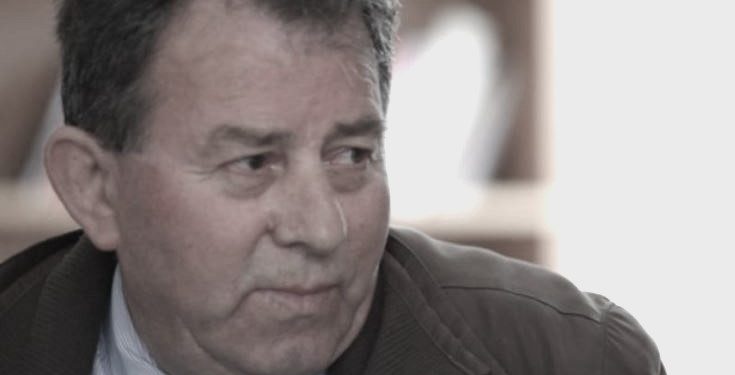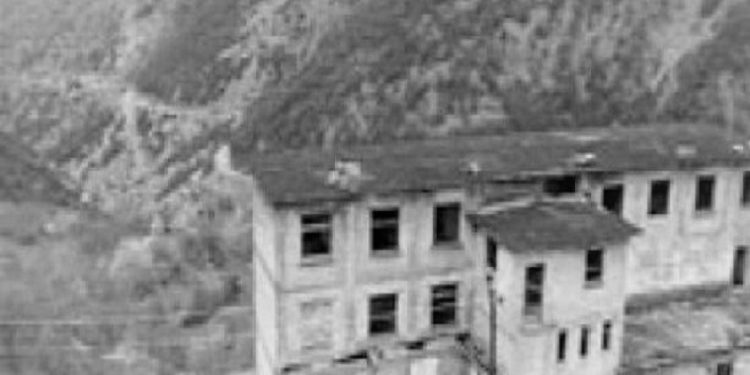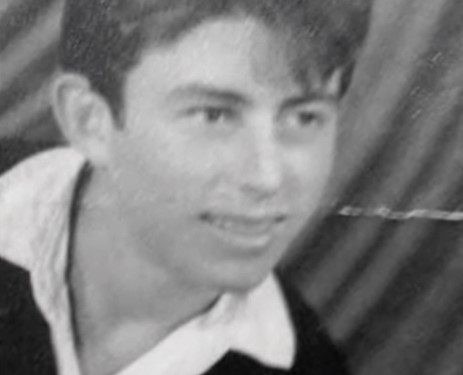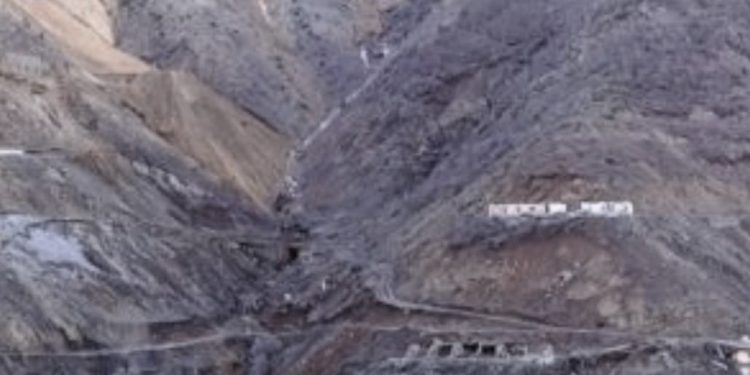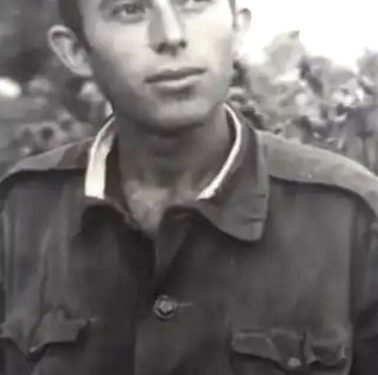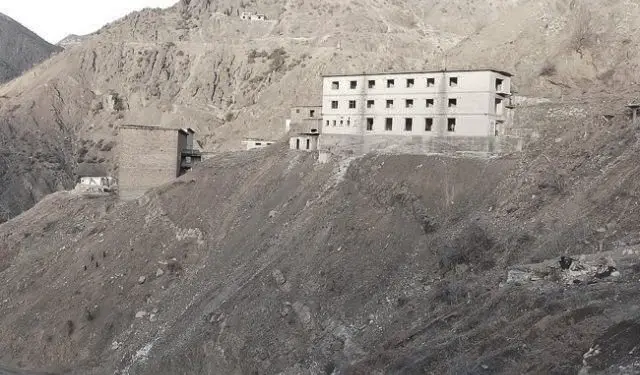By Shkëlqim Abazi
Part Six
Memorie.al / I were born on 23.12.1951, in a black month of a time of mourning, under the blackest communist regime. On September 23, 1968, the sadistic chief investigator, Llambi Gegeni, the brutish investigator Shyqyri Çoku, and the cruel prosecutor, Thoma Tutulani, mutilated me at the Branch of Internal Affairs in Shkodër; they split my head, blinded one of my eyes, deafened one of my ears, after they broke several of my ribs, half of my molars, and the thumb of my left hand. On October 23, 1968, they took me to court, where the pathetic Faik Minarolli gave me a ten-year political prison sentence. After my sentence was halved because I was still a minor, a sixteen-year-old, on November 23, 1968, they took me to the Reps political camp, and from there, on September 23, 1970, to the Spaç camp, where on May 23, 1973, in the Revolt of the political prisoners, four martyrs were executed by firing squad: Pal Zefi, Skënder Daja, Hajri Pashaj, and Dervish Bejko.
On June 23, 2013, the Democratic Party lost the elections, a perfectly normal process in the democracy we claim to have. But on October 23, 2013, the Director General of the “Renaissance” government sent order No. 2203, dated 23.10.2013, for the termination of a police employee’s duty. Thus, Divine Providence became entangled with the neo-communist “Renaissance” Providence, and precisely on the 23rd, they replaced me, with nothing less than the former operative of the Burrel Prison State Security. What could be more telling than that?! The former political prisoner is replaced by the former persecutor!
The Author
SHKËLQIM ABAZI
REPSI
(The Forced Labor Camp)
Memoir
Six Hundred Grams
(The daily routine, in the sleeping camp)
Elders hunched over from age and cold, moved up and down during their work. They puffed out clouds of steam from their mouths and noses, as if exhaling the smoke of thousands of invisible pipes. I stopped at the threshold of the door. From there, the Fan valley unfolded before me, but the part that caught my eye wasn’t an impressive panorama.
With a quick glance, I made what you could call a reconnaissance of the place where I had been confined. Below, under the camp’s fence, lay the Fan River generator, and beyond it, the road that snaked towards the Spaç mines, where I too would end up a little later. Above the road, a hill rose, and still furthers, on the horizon, the Munella and Kalimash Mountains. This was the panorama, at first glance.
The location where the sleeping camp was positioned was a sort of perfect rectangular quadrilateral, which stretched along the side of the road that climbed to deep Orosh. In all four segments of the geometric figure, the barracks were stuck, similar to the one where I spent my first night.
My barrack was at the highest point, the other, on the left side of the junction or at the bottom of the camp, and the third barrack on the left also served as a sleeping area. So, in three barracks that formed a “U” profile, about three hundred prisoners were housed when I arrived there.
To the right of the entrance, starting from the guard officer’s office, the food and clothing depot were lined up next to each other, with the infirmary behind it. In the middle, a vacant space was left, no wider than two meters, which was used as an exit to the work camp, and also served as a path to the infirmary or to the isolation cells, which were hidden a little higher up.
Also on this path was Noya’s shop, where various food items and clothing were sold (but it was mostly empty due to lack of supplies). Next to it, in a nook about three square meters, was the card catalog, where an accountant named Theodhoraq Vangjeli, from the Korça district, “served” his sentence?
This former naval officer, sentenced with the group of Teme Sejko, after having contributed to the denunciation of his comrades, was now, as “punishment,” serving his sentence by cutting invoices for the shop.
Further up was the culture hall, which was never used for culture during the two years I was there, although they had put up an emulation stand at the door, and inside they had lined up some unplanned wooden tables and benches. Later, when the number of prisoners increased, this building was turned into a barrack.
Even higher up was the mess hall and next to it, the kitchen. At the very top, the toilets, as I described above. Between the buildings on both sides, an empty space was left, which they had arranged into terraces on two levels, utilizing the configuration of the relief.
On the first one from the bottom, they had rigged up a makeshift building on four wooden pillars and covered it with rusty sheets of pitch barrels, which they called a private kitchen. They lit fires in some hearths on pieces of bricks, where they placed pots for cooking or buckets and cauldrons to heat water for washing clothes and for showers. Above on the roof, smoke billowed, as if from a chimney stack.
Below, on the first terrace, the faucets were also installed. In a type of concrete trough, like the basins where animals drink water, they had installed a tube similar to a well spout, where water poured out through six holes drilled directly on it. From the first two holes, water flowed sufficiently, from the next two, less, and from the last two, drip by drip. So, practically only four worked.
Three hundred prisoners had to meet their hygienic needs at four spouts of water. And they were not faucets as everyone imagines, with valves or downward spigots, but a straight spout with side holes, which could splash water on your chest if you weren’t careful, and get you soaked, because the water occasionally burst out with pressure.
Next to them, another building was erected with concrete blocks, about two meters high, three long, and one and a half meters wide. They had divided it into four annexes without doors, where the three hundred prisoners were supposed to wash. The strange thing was that these pigsties were called “showers,” even though they had nothing in common with real showers.
Above these non-existent makeshift showers, a second terrace extended, thirty-five meters long and somewhere between six and seven meters wide, which had a dual function: twice a day it served as a “pen” for counting the “flock” of prisoner-livestock, while the rest of the time it took on a more noble function, turning into a “piazza” where the prisoners milled about.
This was more or less the layout of the place where I would spend nearly two years. In the political camps, two categories of convicts coexisted. The laborers and the “six-hundreds.” The first group, as I said, included the laborers, the ones I saw in the morning performing synchronized actions.
Unlike the rest, they were treated with a slightly more differentiated food ration. They were given eight hundred grams of bread, a ladle of soup in the morning, one for lunch (it was said to have meat, but you rarely got a single strand), and for dinner, a ladle of tea. Of course, this was not some incredible portion, but in prison conditions, it ensured survival.
However, on the other hand, in compensation for this treatment, these wretched men had to slave away to meet the norm, otherwise, punishment awaited them behind the pillars, on the road to Golgotha, as I would experience later.
The second group included the “six-hundreds.” This category in the forced labor camps represented the elderly, the disabled, the chronically ill suffering from incurable diseases, such as various cancers, advanced diabetes, pre-cardiac infarctions, venereal diseases, mental illnesses, irreversible mutilations; in short, a considerable mass of political prisoners.
And finally, there were the temporarily sick, those who, after operations for acute trauma such as stomach, liver, appendicitis, etc., returned from the prison hospital with medical reports. As a result of the doctors’ recommendation, they were supposed to be treated with special food; however, this remained only on paper, because in practice, no one could benefit from it, since the camp command considered it an excessive luxury.
Such “squeamishness” they considered “specific fabrications,” worthy of bourgeois-revisionist countries, where class and racial distinction was the fundamental feature of “orderly” division. “In our socialist Albania, in the new society we want to build, these differentiations are unacceptable. We are installing a just order, where everyone must be treated equally!”
Which meant: everyone in rags?
Special food, even though it was not much more in quantity than the regular one, was treated, according to the criminal mentality of the ignorant camp leaders, as “concentrate for fattening pigs on livestock farms,” and the doctors who recommended it were simply called “bourgeois pigs in white shirts.”
Without exception, all these categories were treated to six hundred grams of bread a day, a ladle of soup in the morning and at noon, naturally without meat, so that the enemies wouldn’t get fat! and with eighteen grams of oil, but even this, when they would throw it in!; in the evening, a ladle of tea without sugar, (of course, to protect them from diabetes).
The same treatment was given to those isolated in the camp cells, in the Burrel prison, in the prison hospital, in the detention rooms of the Internal Affairs Directorates in the districts, in the Tirana prison stalls, and everywhere else where political prisoners were isolated. So practically, both the first and second groups were always hungry.
After the initial numbness, I followed the priest to the lower terrace. He stopped at the faucets and was washing. I also splashed a couple of handfuls of water on my eyes, just to taste the water. Suddenly, a crazy desire was born in me; I rejoiced at the water like a greedy person! I continued to splash handful after handful, without restraint.
“How good water, water!” I felt like those Tuaregs of the desert who touch an oasis after days and days of traveling through an ocean of sand.
“Oh, water, water, endless water! Thank God, Lord, free! Free to use as much water as I want! Oh, what pleasure?” I rejoiced.
I remembered that for weeks and months, I had not had the chance to see so much water. Every morning and evening, they allowed me to fill only one dirty canteen, which was not enough to quench my thirst, let alone washes! Since the day of my arrest, I hadn’t had a bath, except for times when I secretly put my head under a faucet, but even that I paid for with a beating.
I was splashing with cold water, spreading it so willingly on my neck that I forgot it was freezing, and meanwhile, I forgot I wasn’t alone. The splashes that spread from hitting my face were unintentionally wetting others.
“Hey, young man, learn how to wash, my friend! You’re soaking us, you white-face!” – I heard a Labëri dialect.
I looked at him in surprise.
“I’m sorry, uncle!” – I replied.
“Oh, he says ‘I’m sorry’! Are you crazy, or what?”
“I haven’t washed in a while!”
“Why, are you a visitor?”
“They brought us last night!”
“Where are you from?”
“From Berat.”
“Right, right! From what village?”
“From Berat.”
The Labi, a tall and skinny old man like a dogwood tree, turned to the other side and, in a loud voice, called out:
“Sulo, oh Sulo-oo!”
I turned to where he had called. An elderly man with glasses, a white hat, and a newspaper in his hand, got up from a rock where he was sitting as if on a bench.
“What is it, oh Daut, what’s wrong?” the other replied, bent in two.
“Come up, you white-face, a patriot has come for you!”
Sulo, wearing a pair of wool socks and a pair of thick wooden clogs that had pieces of rubber sewn to the bottom to prevent slipping or clanking, slowly climbed the stairs.
He came towards us with an outstretched hand:
“Where are you from, boy?” – he asked me in one breath.
“From Berat.”
“Whose are you?”
“I told him who I was.”
“Come a little closer, I don’t see very well. Boy, are you really the son of Lime?!” – his thick glasses, like the bottom of a jar, almost touched the tip of my nose.
“Yes!” – I confirmed.
“Which son?”
“The third one.”
“Oh my, has it come to your turn too, you people?!”
“It seems so!” – I replied.
“Ah, criminals, now you’re bringing the kids in too!” – And he aimed his thick glasses somewhere, perhaps at an unspecified point in the sky, murmured something like a prayer and turned to the Labi:
“Oh Daut, this is the son of my friend! I grew up with his father, we’re childhood friends!”
“Really?” – said the Labi and looked at me with curiosity.
“Yes, by Allah! – the bespectacled man swore. – This boy is of good stock!” – he added.
From under the glasses, I saw a couple of teardrops rolling down his face, wetting his eyelashes and following the furrow of a wrinkle. He wiped them with his finger, and then pretended his sick eyes were to blame, but his trembling shoulders betrayed the poor old man.
Was he crying!?
He was crying, perhaps also for his own sons, because he thought that now it was the turn of the second generation to replace the fathers in the communist prisons. He sat down on a brick after calming down a bit and began a series of questions:
“How long did they sentence you for? Why did they sentence you? When did they bring you? Where did you come from? How did you leave Berat? What was going on in Berat??? etc., etc.”… Endless questions. He wasn’t waiting for an answer; he just went on and on, inexhaustibly.
I felt a wave of heat rising from my gut and burning my chest, when I saw that old man longing for his people, for his city, for the stones of the alley, for the river’s sounds, for everything from which they had been violently separated.
The tears of that weakened old man multiplied the hatred accumulated in my isolation.
“Cursed be this criminal, sadistic, perverse regime, this plague that separates fathers from sons and vice versa!”
Perhaps, who knows how far my rage would have gone, but at that moment a towel blocked my view. It was the priest, who had in the meantime washed his face and was holding the towel around his neck:
“Oh Sulo, leave these things, the boy needs to eat and wash! – it seems from the basin,” – Vaska had followed our conversation.
“Yes, you’re right, but the longing, brother…”! – Sulo replied.
“Come on, now, go, and find us some wood for the fire!”
“Are we going to cook for them?”
“That’s what Sheref is thinking about. I’ll make some trahana and that’s that. I’m going to see if I have a piece of soap and some clothes left!” – the priest added.
“Let him eat and wash first, then you can talk your fill! You have five years, Sulo!” – the Labi teased him.
“I’m going, and then we’ll talk!” – the old man said and went down the stairs.
They had intervened at the right moment, they pulled me out of a sad situation, and Sulo, perhaps, and they saved from a possible heart attack.
As we were parting, the whistles of the police were heard, followed by the hoarse voice of the herald:
“For roll call! For roll call!”
As soon as the signal was heard, a flock of old men gathered in the upper square, in front of my barrack. They lined up in twos, without anyone giving a command. I got in at the end. The counting began.
The line with their heads uncovered passed like a flock of sheep through a pen, in front of two policemen who had taken the stairs that led to the bathroom. The old men, leaning on each other or on crooked sticks that served as canes, shuffled in rows of three.
I saw the crippled with crutches under their armpits, dragging their legs, I saw one with one leg, one with one arm, and even one without arms at all. The physical appearance of these poor wretches stunned me.
“Oh God, where have they brought me?”
“To prison!” – my alter ego replied.
“Why, is this prison or an orthopedic pavilion?”
“What did you say?”
“Nothing, nothing! I asked you, ‘Am I in prison’?”
“Why, what did you expect, sir?”
“But they’ve filled the political prisons with these cripples and invalids? Oh God, this regime is afraid of these disabled people? Shameful!”
But the powerful voice of the herald cut short this rhetorical meditation. Memorie.al




